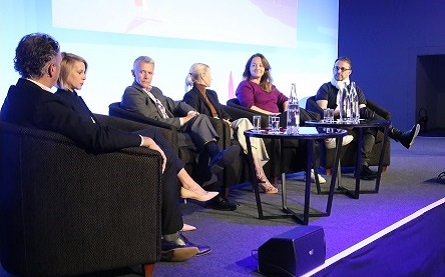This was the first discussion topic for the FIDI business sessions. It was billed as a discussion that would help the business leaders of today navigate the challenges ahead including: COVID, the war in Ukraine, climate change and new technology.
 The subject was both relevant and topical, and the panel was undoubtedly qualified to provide their opinions: but it was a huge subject.
The subject was both relevant and topical, and the panel was undoubtedly qualified to provide their opinions: but it was a huge subject.
The session was expertly moderated by Jesse van Sas, Secretary General FIDI and included: Yann Blandy from Santa Fe Relocation; Mark Burchell from Suddath; Isabelle Dumortier from EY Design & Engineering; Laura Ganon from Fink Mobility and Joleen Lauffer from Aires.
Jesse started the ball rolling by asking how a conservative industry, that doesn’t much like change, can cope during a time of profound disruption.
Mark Burchell pointed out that the recent developments are nothing new. There has been significant change for many years with compliance regulations and new policies for assignees. “We have been in a constant state of rethinking and motivating our teams,” he said.
Joleen Lauffer agreed that the current crisis is not new. “We are constantly tasked with how we elevate our game and it's our clients who are driving us. Change management is here to stay and when some of these more extreme crises are over there will always be political or environmental challenges that we need to navigate.” That said, she did admit that: “It would be great for our industry to sometimes be in the driver’s seat rather than being pulled along by our corporate clients.”
Isabelle Dumortier said that in her experience it is unrealistic for a company to plan to change too many things. Much better to have one “big audacious goal”, she said. “What does that mean for this year, this quarter and this week? Data shows that companies that want to change more than three things, don't achieve them.”
Yann Blandy disagreed. “It doesn't matter what strategy you have, you need to look at the cash, make sure you're surrounded by the right people and stop bleeding,” he said. “Step two is about focussing on different scenarios rather than being stuck with one goal.”
Mark took a more balanced view. “I think we have to be agile, open and flexible. You need a plan to communicate to your employees and your communities and I agree that having two or three headline goals is important. But you also have to be agile enough to adapt as circumstances change.” He also said that, in his opinion, the extraordinary crises we have seen in the last few years, SARS, 911, COVID, the financial crisis, form a pattern. “They were not unexpected, we just didn’t know where they were coming from.” ...
Photo: The panel discussion.